-sion, -sions
(Latin: a suffix found at the end of some words that make certain verbs become nouns.)
If you need any information regarding the pronunciation system being used for the words in this unit, click on this Pronunciation Chart for a presentation of simplified American-English pronunciations.
2. The misunderstanding of a situation or the facts: In Jim's English class, there was a lot of confusion about the difference in meanings between the terms “facetious” and "fictitious” because many of the students had problems using these words correctly in their essays.
3. A failure to distinguish between people or things: Jane was in a state of confusion about her new relatives and had to write a list of who belonged to which side of the family.
4. A chaotic or disordered state: The children played together wonderfully in David's bedroom; however, when they left the room, it was in complete confusion with the table turned upside down, the bedspread was on the floor, the toys were scattered all over the place, and the books were not in the bookcase anymore!
5. Self-consciousness or embarrassment: Sara was in a state of confusion and very upset after realizing that she had greeted someone whom she thought was her sister-in-law.
2. The accomplishment of a point or free throw in a sports activity; such as, American Football: The team captain kicked the ball for the conversion, tying the game, 1 to 1.
2. An uncontrolled fit, as of laughter: When Jed tickled his little sister, she couldn’t help herself and was giggling and having convulsions and couldn’t stop!
3. Violent turmoil: The market convulsions of the last year have shaken the global markets and economies.
4. Etymology: from Latin convulsionem, from the past participle stem of convellere, "to tear loose"; from com-, "together" + vellere, "to pluck, to pull violently".
2. Etymology: literally, "gnawing together".
2. A position, opinion, or judgment that is reached after consideration: The politician made a decision that was unfavorable for his supporters and so, he lost the election.
3. Passing judgment on an issue under thinking about it: Greg asked, “Has Jack’s father come to a decision yet, as to whether we can use his car to go to the beach this weekend?"
4. A conclusion or a legal judgment reached or pronounced; a verdict: The judge went into his office where he had to think about which decision or ruling he should make regarding whether the testimony of a witness could be considered valid and legally acceptable.
5. In sports, when there is no knockout in a boxing match, the awarding of the fight goes to the boxer who won the most rounds or with more points than the opponent: A controversial decision was made one evening at the boxing club which resulted in Jack winning the contest.
6. Etymology: "to settle a dispute", from Old French decider, from Latin decidere, "to determine"; literally, "to cut off"; from de-, "off, down, down from, from" + caedere, "to cut".
A grammatical case involves such declensions which are used to show their relations to other words: "I" is the nominative case; "me" is the objective case; and "my" is the possessive case.
2. A refusal or a rejection: The declension the teacher made prohibited the children from leaving the group at any time during their field trip to the state fair.3. A decrease or a waning of something: A declension of Jack’s fitness was noticeable after being in the hospital for two weeks following the operation on his knee.
4. A slope or a downgrade: After climbing up the mountain and enjoying the view, the group's declension back to their cabin took several hours, but they arrived there before it was dark.
2. An operation to alleviate pressure on a bodily organ or some part of the body: After having severe pains in his back, the doctor made a diagnosis that Ned should have a surgical decompression therapy to the spinal chord to reduce the agony he was experiencing.
3. The process of decreasing the amount of pressure: Something was wrong with the air in the cabin of the aircraft and the plane had to be serviced again; especially, the decompression had to be controlled so the passengers would have proper air to breathe during the flight.
4. The procedure of enlarging information for the computer to its regular size so it can be deciphered by users: In the computer class at school, Jane learned that the process of decompression was significant in order to enable people to properly read the contents because an uncompressed digital image may require 20 megabytes; so, data compression is important in storing information digitally on computer disks and in transmitting it over communications networks; however, decompression provides better understanding.
2. A mental disorder; a false belief strongly held in spite of invalidating evidence; especially, as a mental disorder: Mack had delusions of persecution by all women.
Kerri had delusions of grandeur as an actress.
Sam had the delusion that he was a muscular man as he lifted the weights at the fitness studio.
Zachary had a delusion that all women hated him.
Tanya had the delusion of being extraordinarily beautiful.
3. Something falsely disseminated or believed: Technically, a delusion is a belief that, though false, has been surrendered to and accepted by the whole mind as the truth.The investigators were under the delusion that the safety for the workers was a reality; however, since it was based on a report circulated to the supervisors, it became apparent that they were dishonest and it was made in order to avoid any responsibilities for anything that was really going on.
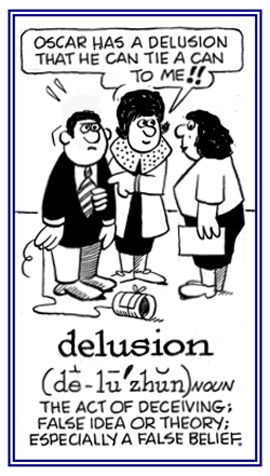
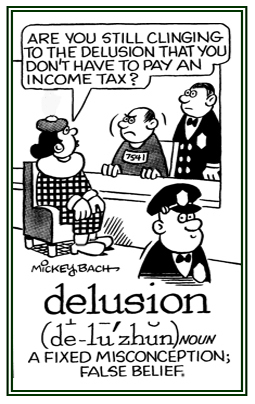
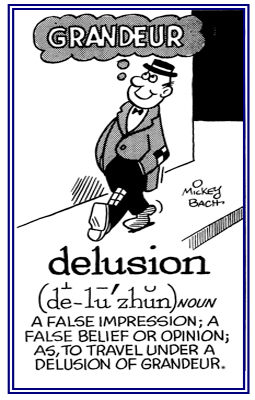
Go to this Word A Day Revisited Index
for a list of additional Mickey Bach illustrations.
After losing both parents in a car accident, Linda not only felt grievous but also very distressed and disheartened and found out from her doctor that she was suffering from a depression.
In psychiatry, a depression is not only a state of severe dejection, but it is also accompanied by a disorder of sleep, appetite, and an absence of energy.
2. A period of drastic decline in a national or international economy, characterized by decreasing business activity, falling prices, and unemployment: After several years of an economic boom, it looks as though some countries may now be heading for a financial depression.Shirley was in a state of depression when her bank informed her of the small interest rate in her accounts because of the current financial conditions.
Starting with 1929 and into the subsequent years, many countries were hit by the "Great Depression", a massive plunge of finances and a decrease in businesses and industries.
3. An area that is lower than the rest of its surface: The depressions, or sunken places, in the street where Joan lives, provide places for pools of water after a rain.4. Low air pressure in an area that is usually accompanied by misty and humid weather can cause tornadoes and hurricanes: A depression in weather can become a hurricane which begins with very bad weather and is known as a tropical depression.
This cartoon provides an example of what the term derision is expressing.
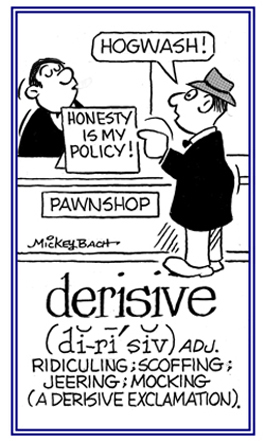
Go to this Word A Day Revisited Index
so you can see more of Mickey Bach's cartoons.
On TV, the political commentator was revealing the social and political digressions that the senator had committed while he was a member of the U.S. Congress.
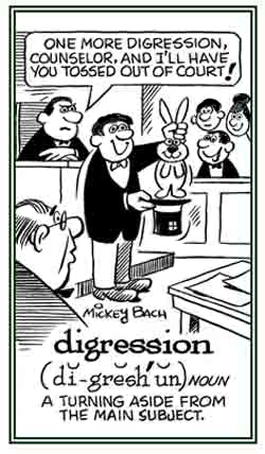
Go to this Word A Day Revisited Index
so you can see more of Mickey Bach's cartoons.
2. The length, the depth, or the height of an object; usually, used in the plural form: First Jackie had to measure the dimensions of the living room before getting the right amount of paint at the store for redecorating it.
2. A detailed consideration or examination of a topic in writing or speech: There was a discourse or discussion in a magazine article about the best and healthiest method to lose weight.


